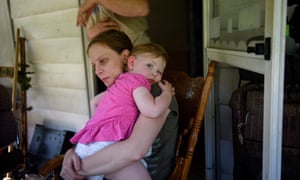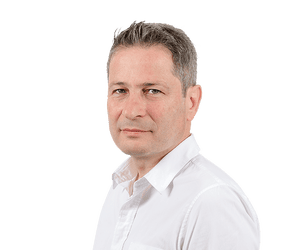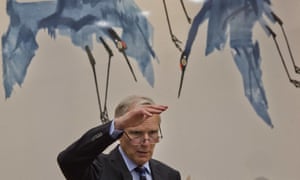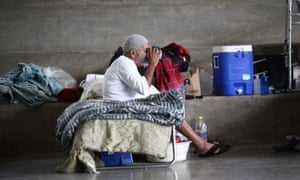The United Nations monitor on extreme poverty and human rights has embarked on a coast-to-coast tour of the US to hold the world’s richest nation – and its president – to account for the hardships endured by America’s most vulnerable citizens.
The tour, which kicked off on Friday morning, will make stops in four states as well as Washington DC and the US territory of Puerto Rico. It will focus on several of the social and economic barriers that render the American dream merely a pipe dream to millions – from homelessness in California to racial discrimination in the Deep South, cumulative neglect in Puerto Rico and the decline of industrial jobs in West Virginia.
With 41 million Americans officially in poverty according to the US Census Bureau (other estimates put that figure much higher), one aim of the UN mission will be to demonstrate that no country, however wealthy, is immune from human suffering induced by growing inequality. Nor is any nation, however powerful, beyond the reach of human rights law – a message that the US government and Donald Trump might find hard to stomach given their tendency to regard internal affairs as sacrosanct.
The UN special rapporteur on extreme poverty and human rights, Philip Alston, is a feisty Australian and New York University law professor who has a fearsome track record of holding power to account. He tore a strip off the Saudi Arabian regime for its treatment of women months before the kingdom legalized their right to drive, denounced the Brazilian government for attacking the poor through austerity, and even excoriated the UN itself for importing cholera to Haiti.
The US is no stranger to Alston’s withering tongue, having come under heavy criticism from him for its program of drone strikes on terrorist targets abroad. In his previous role as UN special rapporteur on extrajudicial executions, Alston blamed the Obama administration and the CIA for killing many innocent civilians in attacks he said were of dubious international legality.
Now Alston has set off on his sixth, and arguably most sensitive, visit as UN monitor on extreme poverty since he took up the position in June 2014. At the heart of his fact-finding tour will be a question that is causing increasing anxiety at a troubled time: is it possible, in one of the world’s leading democracies, to enjoy fundamental human rights such as political participation or voting rights if you are unable to meet basic living standards, let alone engage, as Thomas Jefferson put it, in the pursuit of happiness?
“Despite great wealth in the US, there also exists great poverty and inequality,” Alston said in remarks released before the start of the visit. The rapporteur said he intended to focus on the detrimental effects of poverty on the civil and political rights of Americans, “given the United States’ consistent emphasis on the importance it attaches to these rights in its foreign policy, and given that it has ratified the International Covenant on Civil and Political Rights.”
Poverty experts are watching the UN tour closely in the hope that it might draw public attention to a largely neglected but critical aspect of US society.
David Grusky, director of the Center on Poverty and Inequality at Stanford, said the visit had the potential to hold a mirror up to the country at a moment when globalization combined with a host of domestic policies have generated a vast gulf between rich and poor.
“The US has an extraordinary ability to naturalize and accept the extreme poverty that exists even in the context of such extreme wealth,” he said.
Grusky added that the US reaction to Alston’s visit could go either way. “It has the potential to open our eyes to what an outlier the US has become compared with the rest of the world, or it could precipitate an adverse reaction towards an outsider who has no legitimacy telling us what to do about internal US affairs.”
Alston’s findings will be announced in preliminary form in Washington on 15 December, and then presented as a full report to the UN human rights council in Geneva next June. An especially unpredictable element of the fallout will be how Trump himself receives the final report, given the president’s habit of lashing out at anyone perceived to criticize him or his administration.
Trump has also shown open disdain towards the world body. In the course of the 2016 presidential campaign he griped that “we get nothing out of the United Nations other than good real-estate prices”.
On the other hand, observers have been surprised that the White House has honored the invitation to host Alston after the initial offer was extended by Barack Obama. US diplomats on more than one occasion since Trump’s inauguration have said they welcomed the UN party.
Alston himself is reserving his comments until the end of the tour. But his published work suggests that he is likely to be a formidable critic of the new president. In a lecture he gave last year on the challenges posed by Trump and other modern populist leaders, he warned that their agenda was “avowedly nationalistic, xenophobic, misogynistic, and explicitly antagonistic to all or much of the human rights agenda”.
Alston concluded the speech by saying: “These are extraordinarily dangerous times, unprecedentedly so in my lifetime. The response is really up to us.”
The UN poverty tour falls at a singularly tense moment for the US. In its 2016 state of the nation review, the Stanford Center on Poverty and Inequality placed the US rank at the bottom of the league table of 10 well-off countries, in terms of the extent of its income and wealth inequality.
It also found that the US hit rock bottom in terms of the safety net it offers struggling families, and is one of the worst offenders in terms of the ability of low-income families to lift themselves out of poverty – a stark contrast to the much-vaunted myth of the American dream.
To some extent, Trump’s focus on “making America great again” – a political jingo that in itself contains an element of criticism of the state of the nation – chimes with the UN’s concern about extreme poverty. His call for greater prosperity for white working Americans in declining manufacturing areas that proved so vital to his election victory will be echoed in Alston’s visit to the depressed coal-producing state of West Virginia, which backed Trump in 2016 by a resounding 69%.
In many other ways, though, the Trump administration in its first year has taken a radically hostile approach towards communities in need. He has tried, so far unsuccessfully, to abolish Obamacare in a move that would deprive millions of low-income families of healthcare insurance, was widely criticized for his lackluster response to the hurricane disaster in Puerto Rico that has left thousands homeless and without power, and is currently pushing a tax reformthat would benefit one group above all others: the super rich.
The US poses an especially challenging subject for the UN special rapporteur because unlike all other industrialized nations, it fails to recognize fundamental social and economic rights such as the right to healthcare, a roof over your head or food to keep hunger at bay. The federal government has consistently refused to sign up to the international covenant on economic, social and cultural rights – arguing that these matters are best left to individual states.
Such an emphasis on states’ rights has spawned a patchwork of provision for low-income families across the country. Republican-controlled states in the Deep South provide relatively little help to those struggling from unemployment and lack of ready cash, while more assistance is likely to be forthcoming in bigger coastal cities.
By contrast, raging house prices and gentrification is fueling a homelessness crisis in liberal cities such as Los Angeles and San Francisco – the first stop next week of the UN tour.
Martha Davis, a law professor specializing in US human rights at Northeastern University, said that such vast regional variations present the UN monitor with a huge opportunity. Unlike other international officials, he has the ability to move freely at both federal and state levels – and be equally critical of both.
“There’s a lot that Philip Alston can say about basic inequality that goes to the heart of the rights that he is reviewing,” Davis said.





 选择“Disable on www.wenxuecity.com”
选择“Disable on www.wenxuecity.com”
 选择“don't run on pages on this domain”
选择“don't run on pages on this domain”

